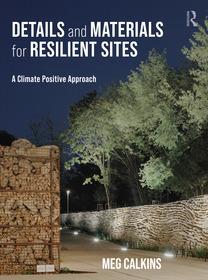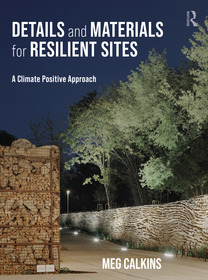
Details and Materials for Resilient Sites
A Climate Positive Approach
- Publisher's listprice GBP 39.99
-
19 105 Ft (18 195 Ft + 5% VAT)
The price is estimated because at the time of ordering we do not know what conversion rates will apply to HUF / product currency when the book arrives. In case HUF is weaker, the price increases slightly, in case HUF is stronger, the price goes lower slightly.
- Discount 20% (cc. 3 821 Ft off)
- Discounted price 15 284 Ft (14 556 Ft + 5% VAT)
Subcribe now and take benefit of a favourable price.
Subscribe
19 105 Ft

Availability
Estimated delivery time: In stock at the publisher, but not at Prospero's office. Delivery time approx. 3-5 weeks.
Not in stock at Prospero.
Why don't you give exact delivery time?
Delivery time is estimated on our previous experiences. We give estimations only, because we order from outside Hungary, and the delivery time mainly depends on how quickly the publisher supplies the book. Faster or slower deliveries both happen, but we do our best to supply as quickly as possible.
Product details:
- Edition number 1
- Publisher Routledge
- Date of Publication 16 July 2025
- ISBN 9781032538570
- Binding Paperback
- No. of pages442 pages
- Size 280x210 mm
- Weight 1507 g
- Language English
- Illustrations 347 Illustrations, color; 226 Halftones, color; 121 Line drawings, color; 199 Tables, color 679
Categories
Short description:
Providing comprehensive information for closing material loops and reducing carbon impacts of site construction, this ground-breaking book is an essential resource for landscape architects and engineers to meet the environmental challenges of the 21st Century.
MoreLong description:
Providing comprehensive information for closing material loops and reducing carbon impacts of site construction, this ground-breaking book is an essential resource for landscape architects and engineers to meet the environmental challenges of the 21st century.
It provides strategies, tools, and detailed information for the practice of climate positive design. Reduced carbon, resource efficient materials, and material mixes are addressed for both standard and alternative materials including stone, concrete, asphalt pavement, brick, earth-based materials, wood, biobased materials, metals, and plastics. Construction considerations are discussed and illustrated, and strategies to reduce environmental impacts are offered. Emphasis is placed on durable, resource efficient structures, and reduced embodied carbon approaches for pavements, porous pavements, green roofs, bioengineered embankments, retaining walls freestanding walls, decks and boardwalks, and rails, fences, and screens. Exemplary case studies from around the world are highlighted, and key resources such as assessment tools, information transparency tools, and benchmarking measures are provided.
Responding to the need for landscape architecture to account for climate change, resource consumption, and habitat destruction, this important book is key reading for both professionals and students alike.
"Meg Calkins has provided cutting-edge material research, specification best practices, and outlined detailing and construction strategies that will accelerate the shift to climate positive practices and sites. This book challenges readers to think beyond short-term gains within project boundaries and instead focus on long-term sustainable practices and decisions at the macro level."
Pamela Conrad, Founder and Executive Director, Climate Positive Design
"The science on the effects of carbon is clear. Calkins has given landscape architects, architects, engineers, developers, and government officials tangible tools for taking action. Now get to work and use them – there are no more excuses."
Lucinda Sanders, CEO and Partner, OLIN
"Meg Calkins continues the revolution she started with The Sustainable Sites Handbook. Here, backed by over a decade of fact-finding and scrutiny, she asks designers and engineers to be leaders in reducing the globe’s embodied carbon footprint, then provides the thinking and steps to get there. She is not asking for sacrifice in quality or aesthetics, but for persistence in expanding our environmental fluency and reach. Let’s answer the call."
Laura Solano, Partner, Michael Van Valkenburgh Associates, Landscape Architects
"Professor Calkins' new book prepares practitioners to deliver climate positive projects through their design and material choices and leads with the necessary sufficiency-first mindset. This is a must-have comprehensive resource for practitioners to leverage their material palettes for climate positive outcomes."
Vincent Martinez, President & COO, Architecture 2030
MoreTable of Contents:
1. Introduction: Details and Materials for Resilient Sites 2. Decarbonization of Materials and Structures 3. Resource Efficiency and the Circular Economy 4. Healthy and Ethical Materials and Products 5. Assessing the Impacts of Materials, Products and Structures STRUCTURES AND ASSEMBLIES FOR RESILIENT SITES 6. Pavements 7. Porous Pavements and Green Roofs 8. Retaining Walls and Bioengineered Embankments 9. Freestanding Walls 10. Decks and Boardwalks 11. Rails, Fences, and Screens MATERIALS FOR RESILIENT SITES 12. Aggregates and Sand Materials 13. Stone Materials 14. Concrete Materials and Products 15. Asphalt Pavement Materials 16. Earth-based Materials 17. Fired Clay Bricks 18. Wood Materials and Products 19. Biobased Materials and Products 20. Metals and Metal Products 21. Plastics and Plastic Products
More












